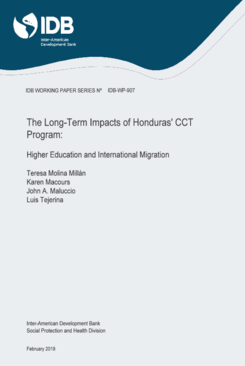The Long-Term Impacts of Honduras’ CCT Program: Higher Education and International Migration
Date
Feb 2019
Conditional cash transfer programs have become a popular social protection tool in developing countries. They aim to reduce short-term poverty through cash transfers and long-term poverty through enhancing investments in human capital. While numerous evaluations of CCTs show positive short-term impacts, there is limited evidence on whether these benefits translate into sustained long-term gains. This paper uses the municipal-level randomized assignment of a 5-year CCT program in Honduras to estimate long-term effects 13 years after program start on a wide set cohorts who benefitted from the program either during early childhood or at school-going ages. We estimate ITT effects using individual-level data from the population census, which allows assignment of individuals to their municipality of birth circumventing usual selection concerns. Results show significant increases in grade attainment for different cohorts of non-indigenous girls and boys. This is reflected in increases in secondary school completion rates and the probability of reaching university studies with more then 50 percent for those exposed at school-going ages. Educational gains are much more limited for indigenous children, though grades attained increases significantly for some cohorts of indigenous girls. Finally exposure to the CCT more than doubles the probability of international migration of young men, from 3 to 7 percentage points.



